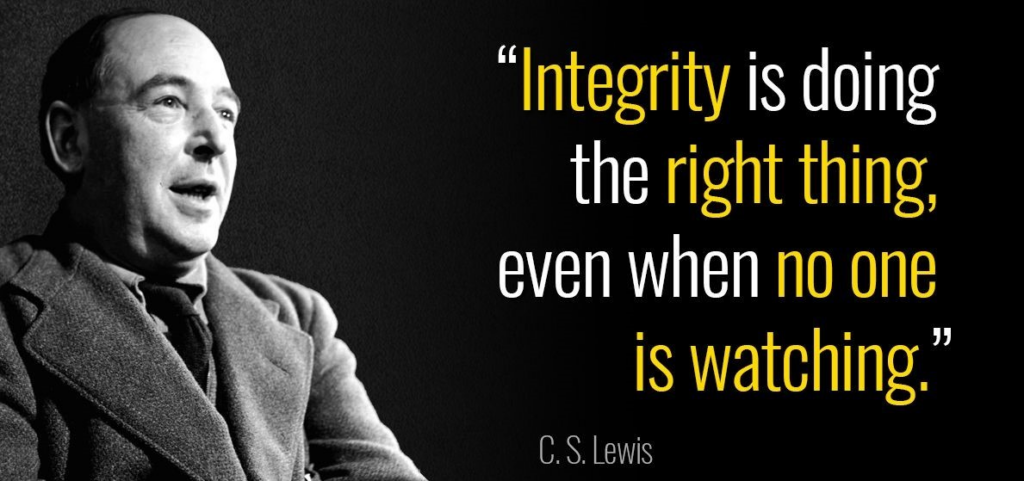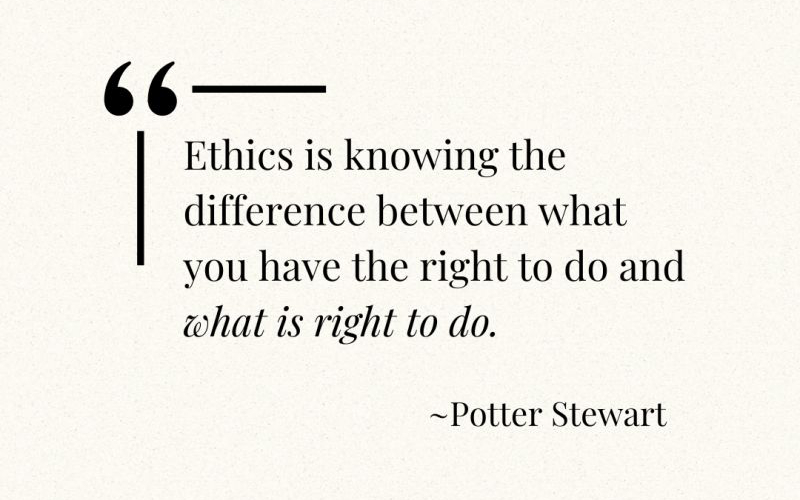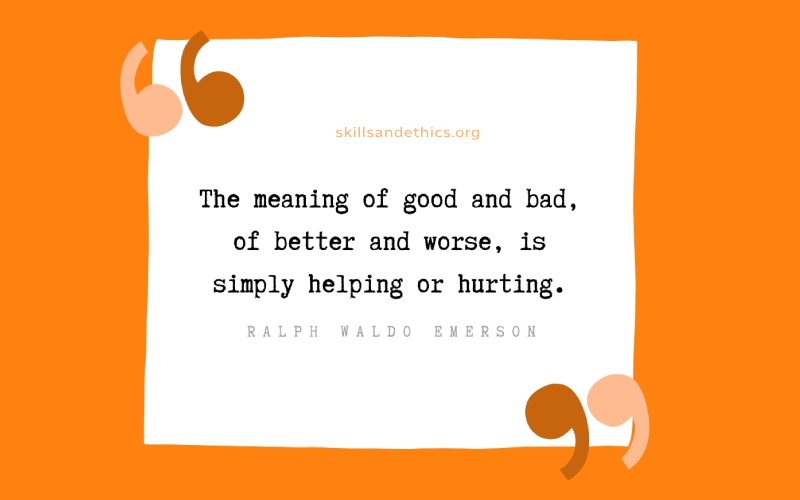Every individual needs some code of ethics to bring balance and peace to their lives.
According to philosophy, Ethics is about what is morally good and bad, right and wrong, fair and unfair. It involves principles and values of human behavior. Ethics is also about decision-making and what human behavior reflects.
Humans live in societies, where ethical values are considered the epitome of behavior. A code of ethics is some rules of moral values and behavior for the people and society.
The code of ethics can be called the moral codes. These aren’t some rules written somewhere these rules are to decide what is right or wrong based on our lives, our behavior, the things we offer to others, and our expectations. We can’t even imagine a world without ethics similar to a country without no rules and regulations.
French philosopher and author Albert Camus wrote, “A man without ethics is a wild beast loosed upon this world.” To better understand ethics we have codes of ethics related to conditions, situations, and expression. Here we have some ethical codes about human behavior to understand better what ethics is:
1st Code of Ethics: Honesty

Honesty is a kind of thread in a garland that holds everything together. This code of ethics is about being genuine, and transparent, having clear intentions & actions, and telling the truth. Such behavior and actions create a safe world around us and we can assume that everyone is on the same page.
In our day-to-day life, honesty means:
1. If we make mistakes we should admit it and try to correct it.
2. We should be clear while communicating, that means no misleading information or half-truths should be told.
3. Consistency towards our actions and words. It means if I commit to something I should follow it.
Honesty isn’t always easy where at some point we have to admit we are wrong but when we commit to it in the long term it creates trust and a respectful environment around us.
2nd Code of Ethics: Fairness

In terms of the ethics code, fairness is about treating people equally without any favor or discrimination. It also involves taking action and making decisions to ensure that everyone gets what they deserve.
These are some aspects of fairness:
1. Treating everyone the same way in any situation.
2. While making a decision there should be no favoritism.
3. Fairness in justice and fair distribution of resources to everyone.
4. To provide different needs to disadvantaged people.
3rd Code of Ethics: Leadership

This code of ethics refers to guiding and influencing while adhering to principles and values. Ethical leadership is about making decisions that are beneficial for the organization and the people involved in it.
Key aspects of ethical leadership:
1. Leaders should be honest and transparent in decision-making.
2. The dignity and rights of others should be valued.
3. Taking responsibility for their actions and decisions.
4. To ensure no partiality towards anyone.
5. Leaders should demonstrate ethical behavior in their actions, to set standards for others to follow.
4th Code of Ethics: Accountability

Accountability refers to individuals or organizations for their decisions, actions, and consequences. This ethical code means being answerable to others and being accountable helps build trust within the organization and people.
Key aspects of accountability:
1. Accountability means justification and explanation for one’s action and decision.
2. Another word is responsibility, acknowledging mistakes and correcting them.
3. Sometimes it faces disciplinary measures and legal consequences.
5th Code of Ethics: Integrity

Integrity is the ethics code that refers to strong moral principles. It includes regularity in fulfilling the standards and values when even no one watching. Like other codes of ethics, integrity builds trust and respect.
Some key aspects of Integrity:
1. It means being truthful in any or every aspect, to anyone including yourself.
2. It includes maintaining consistency of ethics in every situation.
3. It gives moral courage to do the right thing even when at risk.
6th Code of Ethics: Compassion

This code of ethics involves recognition of the suffering of others and a genuine commitment to alleviate the suffering. This ethical code surpasses cultural, ideological, and religious boundaries. Some of the key aspects of compassion:
1. To feel someone else’s pain and put yourself in to their shoes.
2. Beyond feeling empathy, helping the suffering of others.
3. It encourages us to treat everyone with kindness and care.
4. It helps morally to make wise decisions and motivate others to do so.
7th Code of Ethics: Respect

In the ethics code this term is about giving value to instinct and knowing the worth of every individual regardless of their status, background, or beliefs. Here are some key aspects of respect:
1. Everyone has a right to respect by birth, which means everyone should be treated with respect.
2. Treating people without discrimination also includes respect.
3. Listening and giving value to everyone’s perspective.
4. Respecting other’s privacy and their right to make their own decisions.
8th Code of Ethics: Responsibility

The act of being accountable for own actions comes from a code of ethics called responsibility. Every person is accountable for their actions, making sure that they align with ethical codes. Responsibility has its role everywhere starting from family to society, work, or business and even to nature. Every person has these responsibilities to take care of.
It’s all about being able to understand on your own what you have to do to fulfill these responsibilities. No one forces or tells us about the responsibility we hold but when we go out and find ourselves in the world we know exactly what we have to do to make sure that everything we are doing is right.
9th Code of Ethics: Loyalty

Being faithful and honest to the people around us like; family, society, the workplace, and the circumstances around us is called being loyal. It is like giving priority to someone without disturbing someone else’s. Ethics code loyalty stands for being committed and supportive toward people you surround with. It doesn’t mean blind obedience but balancing your honesty and commitment.
In other words, being loyal means being trustworthy, others can depend on you to act in their best interest and to be there for you when needed. This code of ethics applies in the long term in life like in relationships and contribution to society.
10th Code of Ethics: Respect for the law

Respect for the law in terms of the ethics code is to stick to the law and legal terms that are established by society and for society. It only means responsibility towards the law not just blind obedience which means we can question the law if it’s dominating to even a single person. Key aspects of this ethical code:
1. In simple words just following the law or the right instinct for everyone’s betterment.
2. Law is equal to obeying leaders, lawmakers, and the general public.
3. Not the fear of punishment but the moral attitude should value the rules.
4. To be aware of the law if someone is violating their legal boundaries.
11th Code of Ethics: Transparency

Transparency means being open, honest, and straightforward in all actions and circumstances. When information is shared openly it builds trust and empowers others to partake more in any process.
This code of ethics promotes fairness and integrity. Key aspects of transparency:
1. Provide clear information to avoid misunderstanding and build trust.
2. Avoid misleading or half information and share both good and bad news/outcomes.
3. Having transparency makes everything easier for individuals and organizations.
12th Code of Ethics: Environmental concerns

If we are concerned about something, that easily comes in good ethical behavior. This ethical code addresses environmental concerns how people interact with the environment and how organizations interact with it.
Some of the key elements:
1. An individual should understand their responsibility, which includes discussion and contribution to the environment.
2. Making choices that don’t harm the environment and protect biodiversity.
3. Reuse of resources and those who don’t harm the environment.
4. Sustainability: it includes meeting our needs without compromising future generations.
Ethical codes guide us in behavior and decision-making in every field. By following these principles we can create a world harmless, transparent, and believable. These codes remind us of our responsibility and the importance of making our own choices about ourselves, our friends, our family, the society we live in, where we work and the environment around us. In conclusion here are some definitions of ethics codes by well-known personalities:
Justice Potter Stewart wrote about ethics, “Ethics is knowing the difference between what you have the right to do and what is right to do.”

This isn’t very complex to understand. Many known figures have given their thoughts about ethics and ethical values that criticize people and their behavior based on right or wrong.

Another explanation by the American poet, philosopher, and lecturer Ralph Waldo Emerson, “The meaning of good and bad, of better and worse, is simply helping or hurting.” these definitions are the easiest way to understand behavioral ethics. If I would want to say what ethics is, “Doing and behaving good to someone even in your worst phase is true ethics.”




